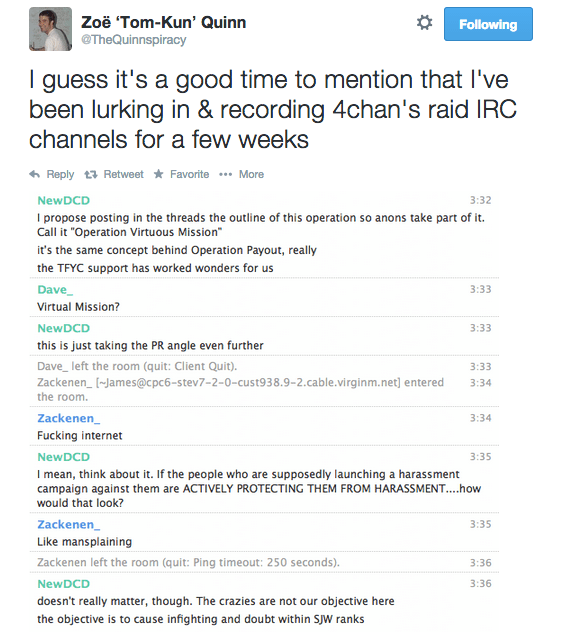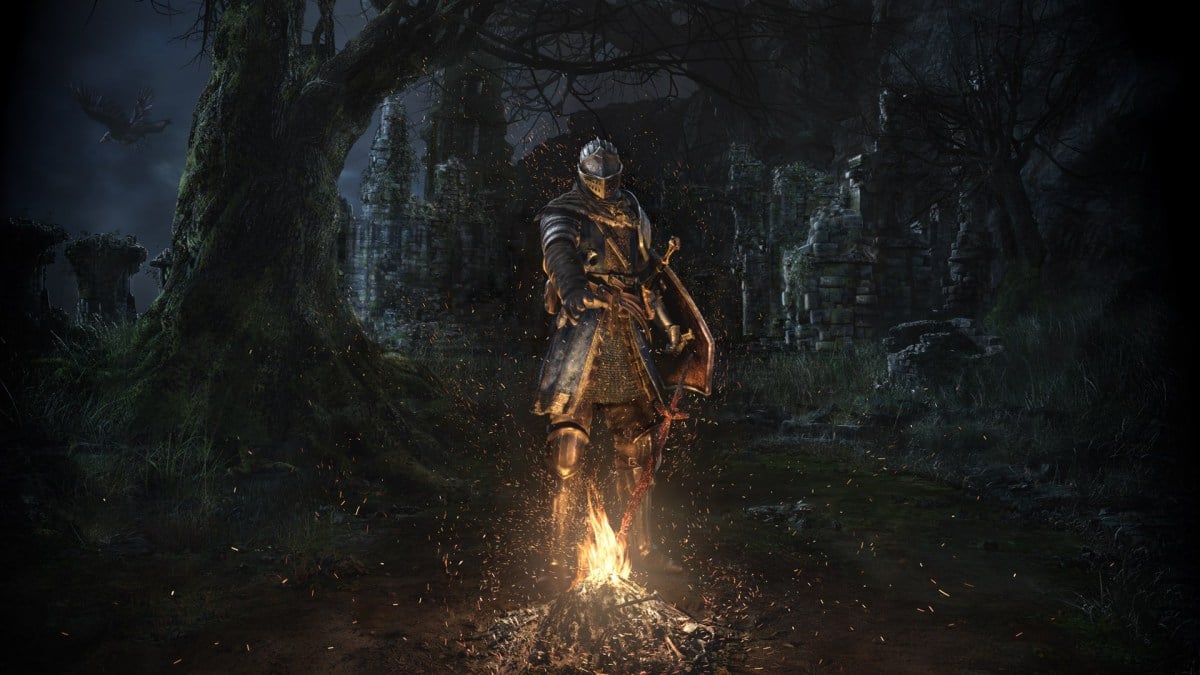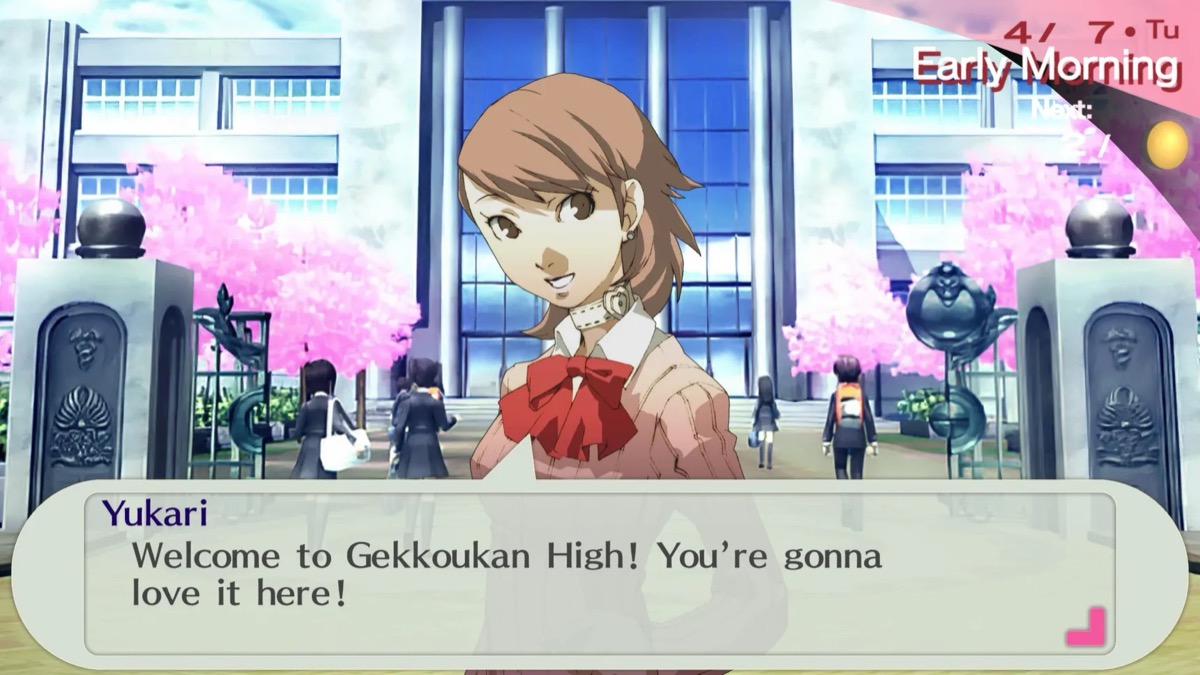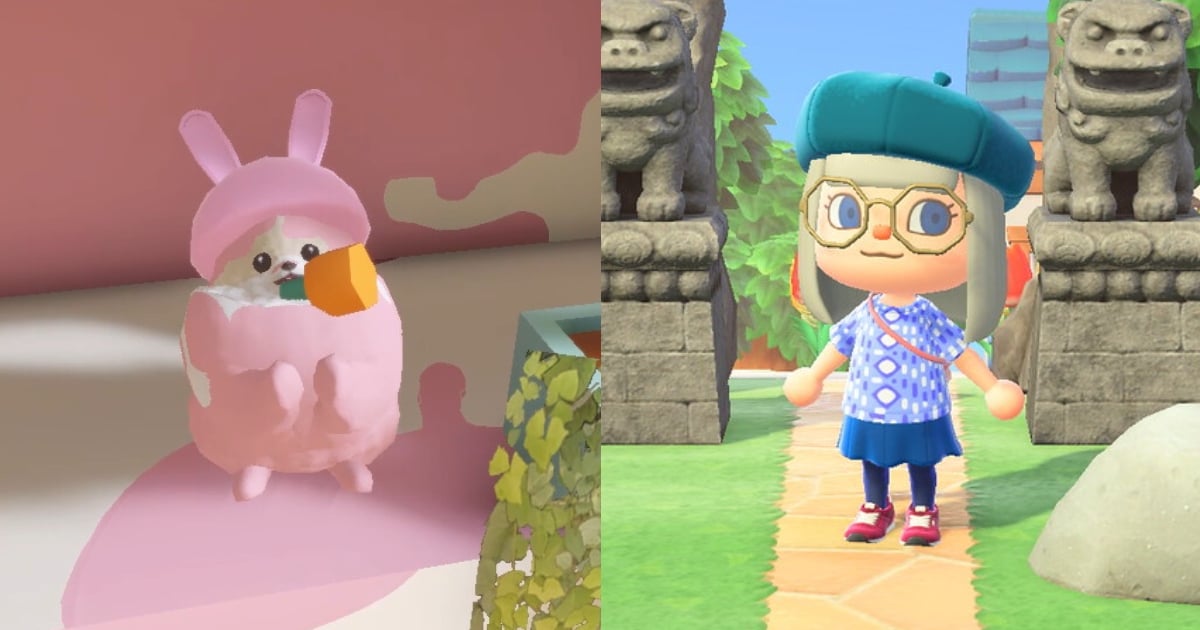I guess it’s a good time to mention that I’ve been lurking in & recording 4chan’s raid IRC channels for a few weeks pic.twitter.com/30Deh5glJn
— Zoë ʻTom-Kunʼ Quinn (@TheQuinnspiracy) September 6, 2014
There’s been another big development in the ongoing Gamergate discussion on Twitter, and it’s a doozy. On Saturday night, Zoe Quinn tweeted a long string of images collected while sitting in a “raid” forum where 4chan users discussed tactics against her and her supporters. All of the images depict members of the forum saying things that suggest the movement specifically sought to discredit “SJWs” under the guise of caring about journalistic integrity; a few even depict Quinn’s ex-boyfriend, who appears to be coaching chatroom members on how best not to “lose” against Quinn.
Members of 4Chan, of course, have denied that this new information proves anything one way or the other. “Most of it is taken out of context to make us look bad and half the images, what she is describing isn’t even taking place,” a 4chan member told The Escapist yesterday. “Seriously, just read the logs she posted and the conclusions she comes to. Some very strange connections.” Other members of the chatroom have published the chatlogs in their entirety (content warning for that link, by the way—there’s a lot of awful stuff in there) as an attempt to discredit her, which might have backfired on them as far as public opinion goes:
Read the full logs, they said. You need CONTEXT, they said. #GamerGate pic.twitter.com/TNozwyrxTr — Tom Lommel (@tomlommel) September 6, 2014
One of the biggest allegations against 4Chan is that members of the forum deliberately manufactured the #NotyourShield hashtag, which consisted of self-identified women and people of color in support of Gamergate, as a way to combat the notion that they are against diversity in gaming.
also #notyourshield was purely to deflect when people started calling out #gamergate as misogynistic pic.twitter.com/1RpX737gQf — Zoë ʻTom-Kunʼ Quinn (@TheQuinnspiracy) September 6, 2014
If proven true, this would not be the first time 4Chan has engaged in such behavior. Back in June they created a fake campaign to “End Father’s Day” as a way of painting feminists in an extremely negative light, and specifically targeted black feminists on Twitter for harassment in the process. Previous anti-feminist hoaxes also include “Operation Bikini Bridge,” in which 4chan members invented and proliferated a new thigh gap-style body classification for women to feel self conscious about, and “Operation Freebleeding,” which attempted to convince women that feminine hygiene products like pads and tampons were oppressive tools of the patriarchy. So for many people, it’s entirely too believable that 4chan engaged in similar astroturfing (a term for fraudulent grassroots organizing) here, despite claims to the contrary.
Some members of Gamergate have not given up yet, however: over the weekend members of the movement also circulated a list of demands, which, among other things, call for opinion pieces to be marked as such and that comment sections more or less remain un-moderated. I don’t think we need to tell anyone who reads The Mary Sue regularly why that last one might not be a good idea.
There has been a failure to explain what journalism is to the general public if #GamerGate kids make this list pic.twitter.com/WA30eLQzgI
— Christian McCrea (@ChristianMcCrea) September 6, 2014
Meanwhile, those who want to discuss legitimate causes for concern in the industry without getting mired in the harassment and trolling that many now expect from #GamerGate have migrated to the hashtag #GameEthics instead. While not as popular as #GamerGate, the tag contains a lot of very interesting information about working conditions for developers and journalists, some of which explores the larger business of mainstream gaming as a whole.
#gameethics working conditions for AAA: bust yr chops to make christmas, which kills quality, then award bonuses based on metacritic — Zach A (@IcePotato) September 6, 2014
Seen reviews time and again where it’s clearly rushed to meet embargo, playing what seems as little as an hour before writing. #gameethics — Conrad Zimmerman (@ConradZimmerman) September 6, 2014
Sexism is a problem in every medium and should be documented and held accountable. The games industry is no different. #gameethics — Asher Vollmer (@AsherVo) September 7, 2014
Things like graphics can’t be graded on a rubric because not every game *needs* to have good graphics, or graphics at all. #gameethics — Carli Velocci (@revierypone) September 7, 2014
I’d love to see a publication financed by it’s viewers instead of ads about the games they cover, but who would pay for that? #gameethics — Dr. Hackenstein (@jhackenstein) September 7, 2014
#GamerGate #gameethics pic.twitter.com/HrzdD2g2Bd — Hotario Papsmear (@ListerTheFister) September 8, 2014
Some #Gamergate devotees claim that this new hashtag is a tactic devised to “divide and conquer” the original movement, but considering that this isn’t actually a war despite the militaristic rhetoric, and that the major part of the movement being “divided” is the one full of harassers and 4chan users looking to upset people, I’m more than okay with that. No one within the hashtag is claiming that the games industry is perfect or that it’s even devoid of corruption, after all; and for those of us who aren’t insiders, it’s a fascinating look into how the industry operates.
But while many want to believe that the worst of Gamergate is over with this new development, it’s important to note that the deeper prejudices and injustices — specifically the online harassment of women involved in the gaming industry — are not going to go away overnight because some 4Chan users got caught with their pants down. In order to make any kind of lasting change, we need to continue to advocate for inclusivity and acceptance in gaming. Hopefully #GameEthics will serve as a small step in the right direction.
- Female Game Journalists Quit Over Harassment, #GamerGate Harms Women
- A Disheartening Account Of The Harassment Going On In Gaming Right Now (And How Adam Baldwin Is Involved)
Are you following The Mary Sue on Twitter, Facebook, Tumblr, Pinterest, & Google +?
General reminder about our comment policy, which specifically disallows personal attacks. Keep your discussion to the issues, or your comments WILL get deleted.








